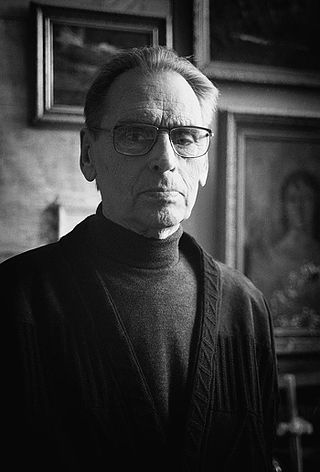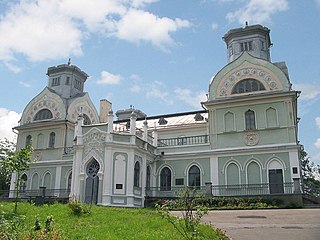Related Research Articles

Eastern Slavic naming customs are the traditional way of identifying a person's family name, given name, and patronymic name in East Slavic cultures in Russia and some countries formerly part of the Russian Empire and the Soviet Union.
Okolnichy was an old Russian court official position. According to the Brockhaus and Efron Encyclopedic Dictionary, directives on the position of okolnichy date back to the 14th century. Judging by the Muscovite records from the 16th and 17th centuries, okolnichy were entrusted with the same business in administration as boyars, with the only difference that they were placed second to boyars everywhere. While lower than boyars, it was one of the highest ranks close to the tsar in the courts of the Moscow rulers until the government reform undertaken by Peter the Great.
Azimov or Azimova is a Russian last name. Variants of this last name include Ozimkov/Ozimkova (Озимко́в/Озимко́ва) and Ozimov/Ozimova (Ози́мов/Ози́мова).
Oleg Nikolayevich Trubachyov was a Soviet and Russian linguist. A researcher of the etymology of Slavic languages and Slavic onomastics, specialist in historical linguistics and lexicographer. He was a Doctor of Sciences in Philological Sciences, an academician of the Russian Academy of Sciences and served as the editor-in-chief of the Etimologiya yearbook. His works are on the etymology of Slavic languages and on East Slavic onomastics.
Yevseyev or Yevseyeva is a Russian surname. Variants of this surname include Avseyev/Avseyeva (Авсе́ев/Авсе́ева), Avseyenko (Авсе́енко), Avseykin/Avseykina (Авсе́йкин/Авсе́йкина), Avsyukov/Avsyukova (Авсюко́в/Авсюко́ва), Aseyev/Aseyeva (Асе́ев/Асе́ева), Yevsevenko (Евсеве́нко), Yevsevyev/Yevsevyeva (Евсе́вьев/Евсе́вьева), Yevseyenko (Евсе́енко), Yevseichev/Yevseicheva (Евсе́ичев/Евсе́ичева), Yevseykin/Yevseykina (Евсе́йкин/Евсе́йкина), Yevsenov/Yevsenova (Евсе́нов/Евсе́нова), Yevsyonochkin/Yevsyonochkina (Евсёночкин/Евсёночкина), Ovseyev/Ovseyeva (Овсе́ев/Овсе́ева), and Ovsiyenko (Овсие́нко).

Yeruslan Lazarevich, also known as Eruslan Lazarevich or, in the Tatar original, Uruslan, is the Russian folk-literature hero of The Tale of Eruslane Lazarevic, which recounts the many military and amorous adventures of a young and beautiful hero. Old Russian readers greatly enjoyed the tale; due to the variety of its content and by appearing frequently in lubok illustrated prints, it spread widely among the people. Its influence is noticeable even on some retelling of tales about Ilya of Murom.

Abashev or Abasheva is a Russian last name. Variants of this last name include Abashenko (Абаше́нко), Abashin/Abashina (Аба́шин/Аба́шина), Abashkin/Abashkina (Аба́шкин/Аба́шкина), Abashichev/Abashicheva (Аба́шичев/Аба́шичева), Abashkov/Abashkova (Аба́шков/Аба́шкова), and Abashurov/Abashurova (Абашу́ров/Абашу́рова).

Lev Konstantinovich Bogomolets was a Soviet Russian painter, a member of the Saint Petersburg Union of Artists, who lived and worked in Saint Petersburg, regarded as one of representatives of the Leningrad school of painting, most famous for his landscape paintings.

Freemasonry in Russia started in the 18th century and has continued to the present day. Russian Freemasonry pursue humanistic and educational purposes, but more attention is given to ethical issues. It was a spiritual community of people united in an effort to contribute to the prosperity of the Motherland and the enlightenment of the people living in it.
Abashin or Abashina is a Russian last name, a variant of which is Abashkin or Abashkina. These last names derive from "Аба́ша" (Abasha) and "Аба́шка" (Abashka)—the diminutive forms of the first name Avvakum—although other theories explaining the origins of these nicknames also exist.
Abashkin or Abashkina is a Russian last name, a variant of Abashin or Abashev. It is shared by the following people:
Agureyev or Agureyeva is a Russian last name. Variants of this last name include Agureykin/Agureykina (Агуре́йкин/Агуре́йкина), Ogureyev/Ogureyeva (Огуре́ев/Огуре́ева), Ogurenkov/Ogurenkova (Огуре́нков/Огуре́нкова), Oguryayev/Oguryayeva (Огуря́ев/Огуря́ева), and possibly Ogurtsov/Ogurtsova (Огурцо́в/Огурцо́ва).
Agin or Agina is a Russian last name. In general, it can be either a variant of the last name Ageyev, or it could be a derivative of other names starting with "Ag-".
Ayedonitsky or Ayedonitskaya is a Russian last name. It was artificially created from the Latin word aedon, meaning nightingale and was given in Russian Orthodox seminaries either to students who sang well in a choir or as a Latin translation of the Russian last name Solovyov.
Temkin, Tyomkin, or Tiomkin are different transliterations of a Russian-language surname Тёмкин/Тёмкина.

The Lopukhin family was a noble family of the Russian Empire, forming one of the branches of the Sorokoumov-Glebov family.
Tyurya, sometimes known as murtsovka, is a traditional bread soup in the Russian cuisine, sometimes considered a variant of okroshka. It consists of chunks of bread, often stale or semi-stale, or dried/baked into sukhari biscuits/hardtack, soaked in a flavorful liquid or, alternatively, plain water, with some vegetables and vegetable oil added and flavored with salt and pepper. The base liquid could be anything that can be consumed cold, because unlike most other bread soups, tyurya was prepared and consumed without heat. Kvass was historically the most popular base for tyurya, due to it being cheap, plentiful and flavorful enough. A dairy base, like plain or sour milk, whey or kefir was considered fancy and was generally prepared for children, the elderly or the infirm. It is, along with pokhlyobka, a traditional Lenten soup.
The Shardak is a river in the Tatyshlinsky District of Bashkortostan, in Russia; it flows into the river Yug. It flows past the villages Old Shardak and New Shardak.
The Alexievsky Cross is a fourteenth century inlaid stone wayside cross installed on the western wall of the Sophia Cathedral in Weliky Novgorod. It is named for Archbishop Alexei of Novgorod, who originally commissioned it.
Pnin is a Russian surname produced by truncation of the surname Repnin.
References
- 1 2 Boris Unbegaun, Russian surnames, — Oxford: Clarendon Press, 1972; Russian version: Русские фамилии, 1989, Chapter IX: "Artificial surnames"
- ↑ НЕСТАНДАРТНЫЕ РУССКИЕ ФАМИЛИИ, citing Суслова А.В., Суперанская А.В., О русских именах, Л.: Лениздат, 1991
- ↑ И. М. Ганжина (I. M. Ganzhina). "Словарь современных русских фамилий" (Dictionary of Modern Russian Last Names). Moscow, 2001. ISBN 5-237-04101-9